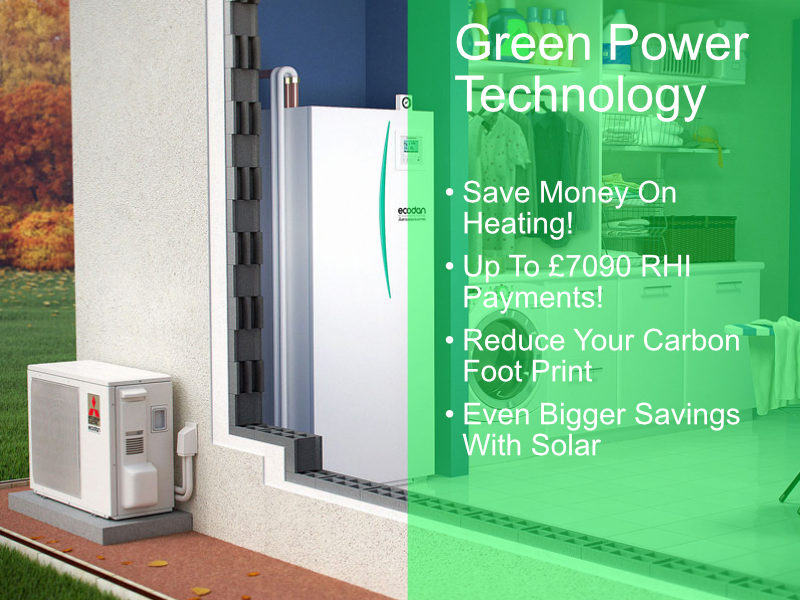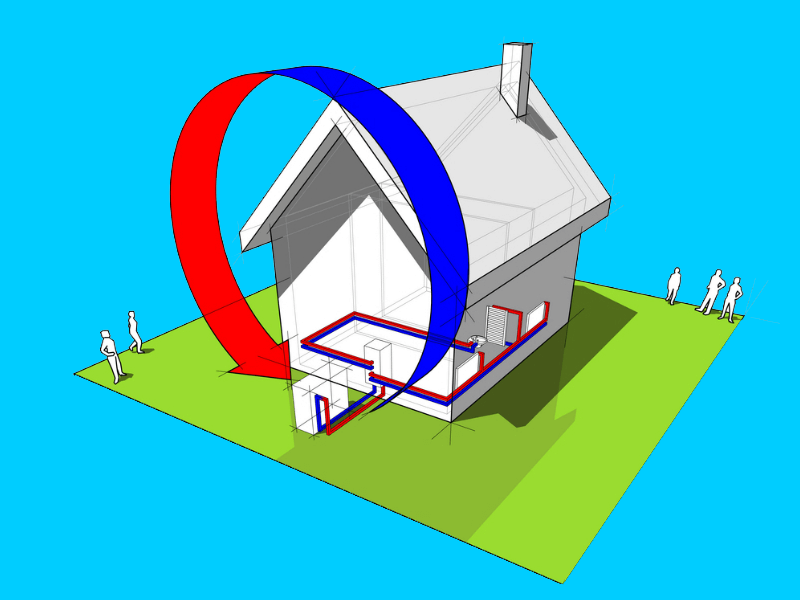Want to get a quote for air source?
Drop us a line today for a free air source heat pump quote!
There are many different types of renewable energy that both homes and non-domestic organisations can benefit from; one popular option is the air source heat pump.
This system is used to heat a building by transferring heat from outside to inside. It can also perform the opposite function to cool a building.
For anyone thinking of using an alternative way to heat their home, an air source heat pump could provide the ideal option.
In the UK, an air source heat pump is eligible for the Domestic Renewable Heat Incentive (RHI), which makes it more affordable to install one.
What Is an Air Source Heat Pump?
Click to get a quote
An air source heat pump offers you one alternative way to heat your home using renewable energy.
It works by extracting heat from the air outside and using it to warm the building. Like any other heating method, they work best when the property is well-insulated, to prevent the heat from escaping.
The pump uses electricity, but the idea is that it uses less energy that it produces from the heat outside.
The heat can be used for radiators or underfloor heating and can heat up water to store in a hot water cylinder.
There are two types of air source heat pump: air-to-water and air-to-heat.
An air-to-water system can be used for your wet central heating system, which might be radiators or underfloor heating.
You might need to install underfloor heating or larger radiators to make the most of the system.
These pumps can be better for new-build properties, but are only eligible for the RHI if the new-build is also your home.
An air-to-heat pump heats your home using fans, which is less common in the UK than it is in other countries.
It can’t heat hot water, so you would still need to have another system for hot water heating.
How Does an Air Source Heat Pump Work?
Click to get a quote
An air source heat pump is normally installed at the back or side of the property. It extracts heat from outdoors, but it doesn’t have to be hot outside.
In fact, a heat pump can still extract heat from the air when it’s -15°C outdoors. It first takes in heat from outside, which heats up a liquid refrigerant.
It uses electricity to compress the liquid and increase its temperature, before condensing it to release the stored heat.
The heat is then used to heat your home and to give you hot water that you can use around the house.
The Benefits of Air Source Heat Pumps
Homeowners, Complete Our Easy Funding Checker to Find Out if You Qualify for Grants or Funding
Air source heat pumps offer a number of benefits to anyone who wants a form of renewable energy for their home or business.
An air source heat pump could save you money by lowering your fuel bills.
Although the pump requires electricity to run, you should still be able to save money thanks to the efficient way that it heats your property.
You can save even more money using the Renewable Heat Incentive Scheme. It enables you to claim payment towards your air source heat pump for seven years using the domestic scheme and 20 years using the non-domestic scheme.
The payments are based on the amount of renewable heat that your system produces.
Those who are most likely to benefit from the RHI are people whose home is not off the gas grid and may be heated using electricity, oil or other fuel.
Using an air source heat pump can also help you to reduce your carbon emissions and be more eco-friendly.
However, how much difference you can make does depend on what type of fuel you’re replacing.
If you replace a system with oil or another fuel you have to have delivered, you will no longer have to deal with fuel deliveries.
There’s also very little maintenance required to keep the pump going. Installing an air source heat pump can also offer benefits over a ground source heat pump.
One of those benefits is that it’s easier to install.
The Running Costs of an Air Source Heat Pump
Click to get a quote
The thing that makes the most difference is what type of heating system you’re replacing.
If replacing an old G-rated gas boiler, you could save up to £465 per year, according to the Energy Saving Trust.
However, you could save up to £545 when replacing a G-rated oil boiler, up to £990 when replacing old electric storage heaters, and as much as £1,350 when replacing a G-rated LPG boiler.
If replacing a new (A-rated) gas or oil boiler, your energy bills are likely to increase slightly per year, rather than being reduced.
The Energy Saving Trust estimates that you can receive RHI payments of between £875 and £1,030 per year.
When it comes to installing an air source heat pump, the cost can vary. The EST says that it could cost you between £6,000 and £8,000 for installation.
With a potential £7,090 in RHI payments, and the potential to save even more on your energy bills, installing an air source heat pump could certainly be worth it.
Where Are Heat Pumps Popular?
Click to get a quote
The use of heat pumps is growing in the UK. They have already become popular in some other European countries, such as Switzerland, Sweden, Germany, Italy and France.
According to a 2015 report from EHPA, air is the dominant heat source for heat pumps in Europe. This is likely because they are easier to install compared to a ground pump.
In 2014, the heat pump market in Europe grew by 3.5%. Sales of air-to-air heat pumps had the most sales, which remained fairly steady between 2012 and 2014, while air-to-water pump sales were smaller but grew slightly.
Countries that have seen large amounts of growth in the use of heat pumps include Ireland, Lithuania, France and Poland, which all had more than 20% growth between 2005 and 2014.
Norway and Switzerland also saw growth in the market during this period. Renovating older homes and other buildings is one of the reasons there has been growth in the market in Europe.
Air source heat pumps are also popular in Nordic countries such a Sweden and Finland because they can still extract heat from the air at low temperatures.
Click to Go SolarEven if they might need to run all day in the winter to be most efficient, they can still save energy.
Worldwide, the global heat pump market is expected to be worth more than USD 60 million by 2025, according to Global Market Insights.
Some of the things driving growth include government initiatives and regulations, the introduction of green building standards and a focus on energy security.
The heat pump market in China is predicted to grow by over 2% by 2025, helped by government mandates to reduce carbon footprints.
Air source heat pumps are largely used for residential applications in Europe. However, they are also used for commercial and industrial applications.
In the US, the market for air source heat pumps is predicted to grow due to people wanting to reduce their carbon footprint and the introduction of government incentives.
Demand for water and space heating will fuel the growth, with water heating in residential buildings accounting for 18% of electricity consumption.
In Germany, there are expected to be 65,000 air source heat pumps by 2024.

The Growth of Air Source Heat Pumps in the UK
Click to get a quote
Other countries are not the only places where the air source heat pump market is growing.
They’re becoming more popular in the UK too, thanks to a number of reasons. In the past, other European countries have taken to heat pumps, both air and ground, much more readily than the UK.
However, things are changing, and the UK is starting to adopt them more. Most heating systems in the UK are gas-based, with the renewable energy market having only a 2% share of heating systems.
Heat pumps are about 1%, most of them being air source pumps rather than ground source pumps.
Historically, there have been a number of reasons that have stopped people from taking up air source heat pumps.
These include the high upfront costs of both the heat pump system and installation, and the cost to run an air source heat pump compared with gas.
Learn More HereBecause an air source heat pump is more expensive per kilowatt than a gas boiler, it doesn’t make financial sense for a lot of homes with modern heating systems.
There are structural issues too, such as the electric distribution network making it more difficult to install pumps. Pumps also need more space, which isn’t ideal for UK homes, which are smaller than in many other countries.
Plus, older homes with low thermal inertia, like many in the UK, are not best suited to heat pumps.
Click to Go Solar
However, there are now several things driving the popularity of air source heat pumps in the UK.
Firstly, there’s the option of benefiting from the Renewable Heat Initiative, which makes the prospect of paying for an air source heat pump installation much more palatable.
If replacing an old heating system, especially one not using gas, property owners could get their money back and more.
The cost of running an air source heat pump system has also lowered, so they can start to present a more legitimate competitor in the energy market.
Running costs are likely to continue to decrease, which is excellent news for anyone considering installing a heat pump.
Another reason that air source heat pumps are becoming more popular is that utility companies are becoming more engaged in the market.
They supply more than 90% of customers in the UK heating market, and have traditionally focused on gas boilers.
However, they have now begun to be more engaged with alternative energy sources, including air source heat pumps and solar energy.
Some large utility companies offer installation of heat pumps or might team up with companies that do.
Changing building regulations is another factor that is likely to encourage the adoption of air source heat pumps.
Government objectives to create Zero Carbon Homes for new residential buildings could mean that heat pumps and other renewable energy options will be considered.
There is also the possibility of having a hybrid heat pump or bivalent system. This offers the option of combining a heat pump with a gas boiler or an oil boiler.
The aim is that the heat pump will provide heating for the building most of the time, but the fuel boiler will kick in when the pump can’t efficiently heat the home.
The heat pump can switch off when the boiler is running or both systems can run at the same time.
Having this additional option can make a heat pump attractive when a pump on its own might not be as efficient as needed.
In 2017, there were around 22,000 heat pumps installed in the UK, according to BSRIA.
Delta Energy & Environment has predicted that the heat pump market will double by 2025, with new-build properties being critical for growth.
They also say that confidence in hybrid systems has grown and that regional governments and housing associations are showing more interest in using them.
Now is a better time than ever to consider an air source heat pump. It is more affordable and potentially comes with excellent financial incentives. It is likely to get even easier and more attractive to install an air source heat pump in the coming years.
Ready to get a quote for airsource?
Find out about any funding or incentives you may be eligible for



